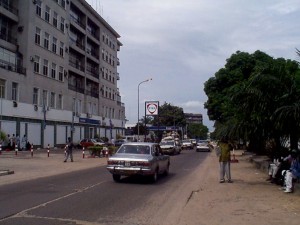
If you travel a lot over a long period you will probably have an accumulation of currency which is very colourful but now quite useless. It will either have been devalued to the point of irrelevance or no longer be in use. I was looking through my stash the other day and came across a 50,000 Nouveau XZaires note from Zaire before it became the Democratic Republic of Congo in 1997. I have traveled to DRC several times, both when it was Zaire and as DRC. I recall going to a small streetside shop to get a sandwich for lunch once and noting that the wad of notes it cost was thicker than the sandwich itself. On one memorable trip to Kinshasa I learned that it is probably better to have a driver than to drive your self ….
Monster potholes
Kinshasa is a sprawling city on the south side of the massive Congo river. It exists like most African cities in a chaotic mix of poverty, shabbiness and vibrance. The airport is some distance from the city on a very dodgy road with some of the most spectacular potholes I have seen on the continent (unless it has been rebuilt in recent years). The city has an annual rainfall of about 2 metres (some 79 inches!) so you seldom get to see the bottom of a pothole and you never know how deep a puddle may be.
I last visited Kinshasa some years back as a consultant to a United Nations agency to work with the government and a number of other interested parties of the development of a national water policy. The workshop was very well attended which surprised us – too often these events are very poorly attended. The reason became clear when it came time to reimburse participants for their expenses and their ‘sitting allowance’. It transpired that the government was in such financial trouble that most government employees had not been paid for a couple of months – the allowances (paid in US$) was critical income. I asked senior officials why they still worked and they generally shrugged and asked what else they could do. If they did not work the country would be that much worse off and perhaps when the problems were over they would get back-pay. That’s commitment.
“During the war all the signs went . . . “

The ‘troubles’ referred to was the long running civil war which is still going on today. (Wikipedia says “the war is the world’s deadliest conflict since World War II, killing 5.4 million people.”) I experienced one of the bizarre consequences of the war on my last visit in 2002 (the capitol Kinshasa was relatively safe by that time). I was picked up from the airport by a government driver to be taken to my hotel. Whilst we were traveling I noticed that at some intersections the driver would slow down and give right-of-way and at others he kept right on going. I looked around to see what was controlling the traffic but could see neither signs nor traffic lights. Eventually my curiosity got the better of me and I asked the driver how it all worked – I would have done better to remain ignorant! The driver said cheerfully “Before the war this was a stop street and this other one was not, but during the war all the signs went – but we know this is a stop street so we stop here and we go there . . . . “.
Best not to hire a car and drive yourself in Kinshasa – if the law of momentum does not get you, the mega potholes will.